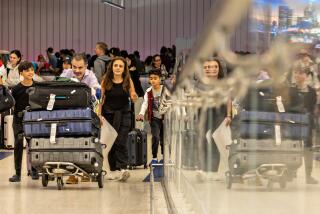Airline industry sees improvement, yet fees keep coming
- Share via
After more than two years of slumping demand and declining airfares, the U.S. airline industry is beginning to see signs of recovery. But don’t expect the airlines to cut you a break on fees.
Total passenger numbers in May jumped nearly 3% from the same month last year, according to the U.S. Bureau of Transportation Statistics.
This May — the latest month for which numbers are available — 82% of seats were filled, up from 80% in the same month last year. Revenue from transporting cargo also soared: 40% for international cargo and 11% for domestic cargo.
But airlines are not forgoing new passenger fees.
American Airlines recently announced an Express Seats option that lets coach passengers choose the roomy bulkhead seats or those closest to the front and be among the first to board. The cost: $19 for short-haul trips and $39 for longer flights.
Effective Wednesday, AirTran Airways raised the price to check the first bag to $20, up from $15. Earlier this summer, AirTran increased the fee to transport unaccompanied minors to $49 from $39 for nonstop flights and to $69 from $59 for flights with connections.
“Most of the fees we see are here to stay,” said George Hobica, founder of Airfarewatchdog.com, a travel website that keeps track of airline fees. He noted that despite improvements in the business climate, the airline industry still relies heavily on fees to stay out of the red.
Rick Seaney, co-founder of Farecompare.com, another travel website, said it is possible for an air carrier to start an industrywide trend of lowering baggage fees to attract customers. But, he added: “I don’t think we will ever not see bag fees.”
• TSA has an ‘enhanced’ pat-down procedure
If you object to getting screened at the airports by the new full-body scanners that can peer through clothes, you can choose to subject yourself to a full-body pat-down search.
But be warned that the Transportation Security Administration has begun an “enhanced” pat-down procedure at certain airports across the country.
TSA officials confirmed that a new procedure is in use. But — for security reasons — TSA officials decline to describe the procedure or say where it is being used.
“We are in the process of evaluating and updating our procedures at airports across the country,” said Nicholas Kimball, a TSA spokesman.
But according to the American Civil Liberties Union and news reports from Boston and Las Vegas, the new procedure may involve some heavy patting and probing of passengers by TSA screeners.
“To call it a pat-down is a euphemism,” said Christopher Ott, a spokesman for the ACLU in Massachusetts. Ott said he has heard from several passengers flying through Boston’s Logan International Airport.
Under the older procedure, TSA officials pat down passengers to identify hidden weapons or explosives, using the backs of their hands to search sensitive areas of the body. But under the new procedure, Ott said, TSA screeners feel and prod passengers with their palms and fingers.
“They really go for it,” he said.
A passenger who underwent the pat-down search during a trip from Las Vegas to Seattle told the Boston Herald: “If anybody ever groped me like that in real life, I would have punched them in their nose.”
• Singapore Airlines publishes a cookbook
Writer Dave Barry once joked that airlines go to great lengths to keep passengers from carrying weapons onto a plane but “then they just hand you a dinner roll you could kill a musk ox with.”
Singapore Airlines believes airline food is no joke. This month it published a book of recipes for dishes served to passengers.
The book may be deceiving because it displays photos of 10 noted chefs, including Gordon Ramsay, who operates several restaurants in Europe and the U.S., and San Francisco chef Nancy Oakes, winner of the James Beard Foundation award for best chef in California.
These chefs don’t prepare the airline food. They advise the cooks at the airline’s catering facility.
Still, James Boyd, a spokesman for the airline, said all 50 dishes featured in the glossy book are or have been served on Singapore Airlines. “Let’s face it, our passengers pay a premium price air travel,” he said. “So they should get premium quality food.”
More to Read
Inside the business of entertainment
The Wide Shot brings you news, analysis and insights on everything from streaming wars to production — and what it all means for the future.
You may occasionally receive promotional content from the Los Angeles Times.










